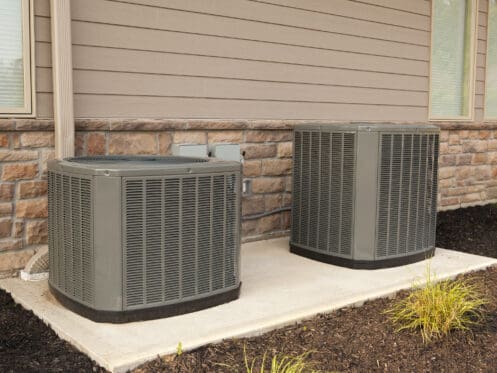Spring in Metuchen, NJ offers a refreshing change from the cold, snow-covered landscape and icy roads of winter. It also gives homeowners the chance to prime their HVAC systems for higher temperatures and increased humidity. From improving your indoor air quality (IAQ) to keeping your heater and air conditioner running efficiently, spring HVAC maintenance is essential. The following checklist will help you get started.
HVAC Air Filter Care
There’s never a bad time for HVAC air filter maintenance. This simple, low-cost component has a surprisingly significant impact on heater and AC performance. You should inspect it monthly year-round and change it as needed. For many households, the ideal schedule for filter changes is every 30 to 90 days. Putting a fresh filter in before proceeding with other springtime maintenance will limit stress on your cooling equipment when you first turn it on and test it.
Check and Clean Your Air Vents, Registers, and Grilles
Build-up of filter debris may have blown off and entered your HVAC ducting during the heating season. This build-up can obstruct airflow and force your AC or heat pump to work harder.
Check all HVAC air registers and vents throughout your home for thick, lint-like accumulations. You can wipe the exterior of these features down using a soft, damp cloth. You can also remove your HVAC air vent covers and vacuum behind them.
Address Air Vent Closures and Air Balancing Needs
In central heating and cooling systems, air vents make air balancing possible. When optimizing overall HVAC performance, our technicians strategically position each to ensure ideal airflow. Air balancing prevents build-ups of static pressure within HVAC ductwork and helps heaters and air conditioners establish a single, uniform temperature throughout buildings.
Unfortunately, many people use HVAC air vents to customize air delivery. This is especially true in winter when frequent heater use makes building interiors feel stuffy and dry. If anyone in your home has shut the air vents in their immediate areas to block the inflow of heated air, you should open them right away. Due to the resulting increases in in-duct pressure, prolonged vent closures can cause problems like overheating, short cycling, and premature failure.
After correcting vent closures, consider scheduling an appointment for air balancing services. This way, our team can return your vents to the correct positions. You can also ask our technicians about the benefits of professional HVAC zoning. Zoning creates separate, independently controlled service areas so that residents can adjust temperatures within their vicinities without harming HVAC systems.
Assess Your Thermostat’s Location
Take stock of your thermostat’s location. This device should be a neutral, central area. If it’s too close to a large, sunlit window, your oven, gaming computer, or any other heat-generating appliance or feature, it won’t read your indoor temperature accurately. You may need to relocate your thermostat if you recently replaced your window treatments, added a new room, purchased a new heat-generating appliance, or made other changes to your living space.
Clear the Perimeter of Your Outdoor AC or Heat Pump Condenser
Air conditioners and heat pumps have indoor air handlers and outdoor condenser/compressor units. Taking care of the HVAC equipment that’s outside your home is just as important as caring for the equipment within it. Your AC condenser should always have at least 24 inches of clearance on each side.
In spring, you’ll need to inspect this component monthly to remove all leaves, twigs, and other tree-fall. It’s also important to cut back any shrubs or other foliage that’s in danger of blocking or encroaching on the condenser cover. Keeping these growths sufficiently far away from your condenser prevents airflow troubles. It also minimizes the likelihood of insect infestations. You should perform AC condenser maintenance at the start of spring and with each HVAC air filter change that you perform throughout the season.
Check for Shifting Soils and Other Landscape or Grading Changes
When inspecting and maintaining your AC condenser, assess the integrity of the concrete or composite pad that supports it. This unit is heavy and highly pressurized. As such, it should always have a stable, level support. Heavy precipitation, dramatic temperature fluctuations, and rapid snow melt can all lead to shifting soils and other landscape or grading changes that cause these pads to slip. If the pad supporting your condenser unit is cracked, tilted, or sunken, schedule repairs right away.
Inspect and Clean Your Roof
Many of the most important tasks on your spring HVAC maintenance checklist don’t involve your heating and cooling equipment at all. Taking good care of your roof before the rainy season arrives will ensure that loose shingles, gutters, downspouts, and other elements don’t come crashing down on your condenser unit.
To ensure that heavy build-up of dirt, silt, leaves, and other wet, organic debris doesn’t weigh your gutters down and cause them to detach, clean these features at winter’s end and again in mid-spring. For many homes, spring is also the best time to schedule annual roof inspection and maintenance service. Caring for your roof in spring will undo the ravages of winter, prime your roof for the rain season, and keep your condenser protected from heavy, falling objects.
Limb Your Trees
Your tree care expert can help you determine the best limbing schedule for the foliage in your yard. Much like roof care, tree maintenance in spring safeguards AC condensers. Tree limbing services remove weak, dead, and dying branches and limbs before they break off and come crashing down.
Establish a Proactive Pest Management Plan
In winter, insects and animals that naturally thrive in the local environment are looking for safe, warm spaces to hunker down in. Sealing off all possible points of ingress helps stave problems with rats, mice, and other rodents off. In spring, insects are often the biggest concern. For instance, even if you don’t have an active termite infestation in your home, you might notice termites swarming in your yard.
While pest treatment addresses existing pest problems, pest management is an ongoing effort to deter insects and animals from congregating in or near buildings. Scheduling pest management services in spring will protect your indoor air quality. If fast-breeding insects find their way into your HVAC system, they’ll leave wings, exoskeletons, and other detritus behind.
Schedule Annual AC Maintenance
The most important step on your spring HVAC maintenance checklist is to schedule annual AC tune-up service. Our technicians perform thorough cooling system inspections. We test the safety and performance of air conditioners, replace worn parts, lubricate moving components, and more. These services keep our clients compliant with the terms of their AC manufacturer warranties, optimize AC performance, and boost overall efficiency. They include:
- Condenser and evaporator coil cleaning
- Refrigerant leak checks
- Condensate drain line cleaning
- Thermostat calibration
As needed, we also perform refrigerant recharge services.
HVAC Air Duct Maintenance
During AC tune-up services, we check HVAC ducting for evidence of air leaks. However, your ductwork needs comprehensive maintenance service too. You should have your air ducts professionally maintained at least once each year. Scheduling this service in spring will eliminate all trapped debris from winter and boost your IAQ ahead of the allergy season. While allergy season in Metuchen often starts in mid-February, the worst months for many allergy sufferers are April through June.
Homeowners throughout Metuchen, NJ and the surrounding cities can count on us for superior heating, plumbing, cooling, and indoor air quality services. We also provide expert oil-to-gas conversions and preventative maintenance plans. To schedule a springtime AC tune-up, contact First Choice Plumbing, Heating & Air Conditioning now!




